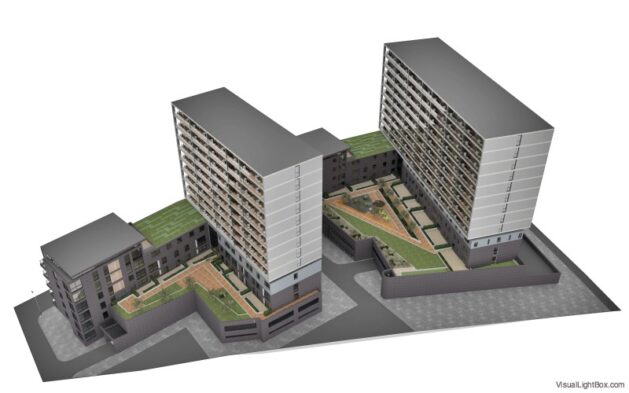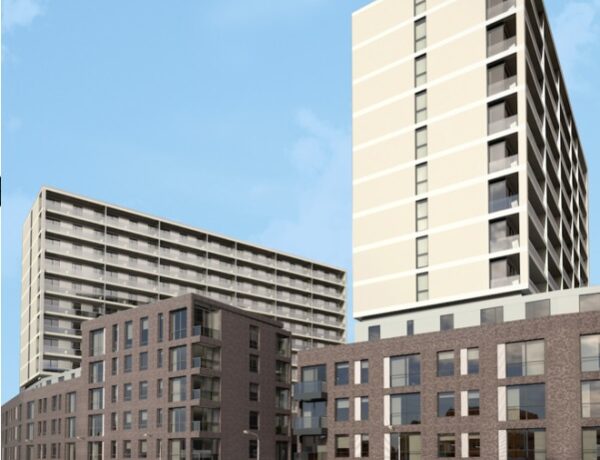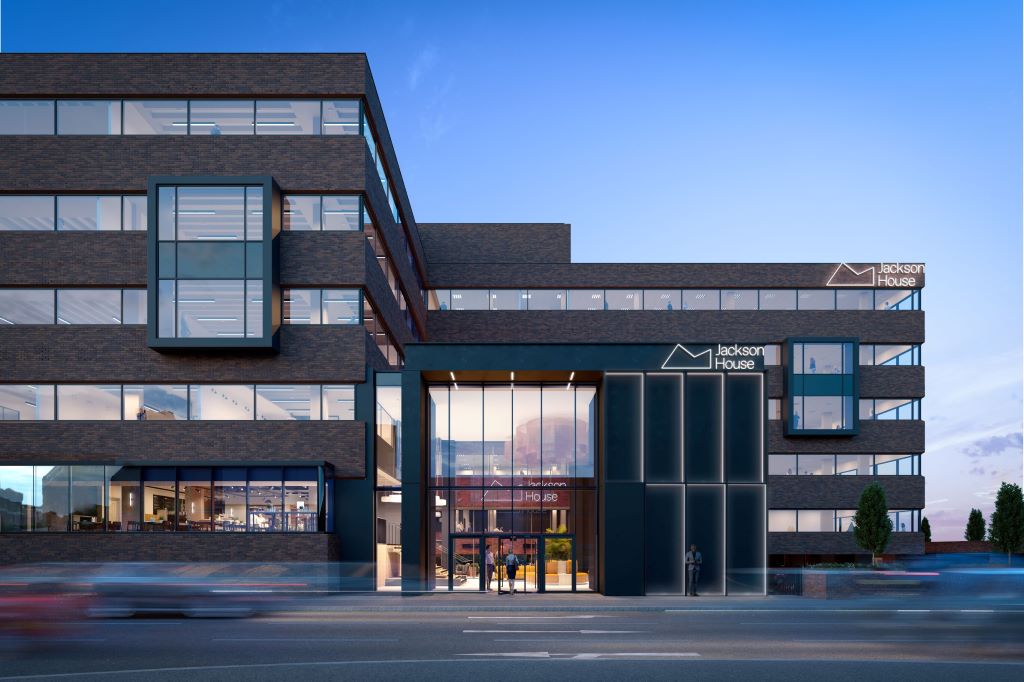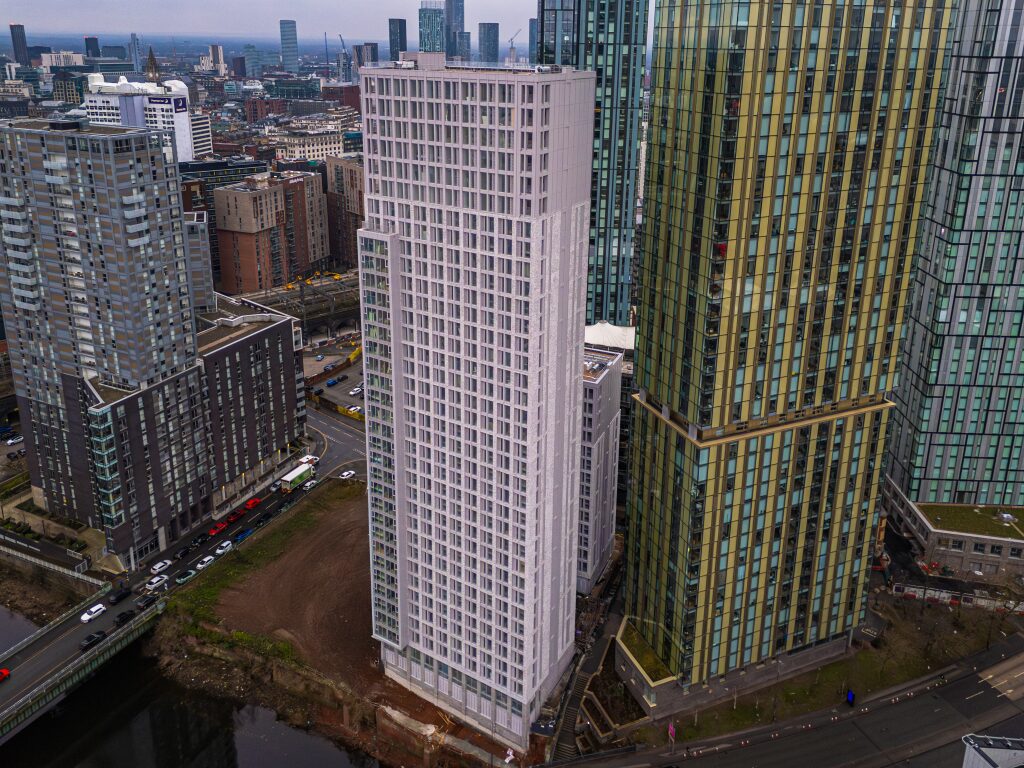Angelgate saga laid bare in administrators’ report
A report has revealed the collapsed developer of the stalled Angelgate residential project in Manchester spent £28.7m of buyers’ money before construction work had even begun, with administrators unable to determine how the money had been used.
Pinnacle (Angelgate)’s 344-home development on Dantzic Street in Manchester, which is subject to investigations by both Greater Manchester Police and HMRC, has seen little activity since original contractor PHD1 exited the scheme in 2016.
Administrators from Moore Stephens were appointed at the developer in September this year, and have now issued a statement of administrators’ proposals, which outline how the £77m project stalled, and the likely outcome for buyers.
The findings include:
- Pinnacle (Angelgate) drew down £28.7m of buyers’ money but administrators were not told how this money had been spent
- More than £13m of buyers’ money was spent in commissions to its sales agent, Pinnacle MC Global Network, leaving the developer £10m short of the initially agreed design-and-build cost before any construction work had begun
- Construction costs on the project nearly doubled in just nine months from £22.1m to £43m
- The administrators are in discussions with a number of interested parties to build out the site as originally planned
- If the site is not built out, buyers are expected to receive 21.4p in the pound of what is owed, which could see them lose out on nearly £24m in total.
The report gives a full rundown of the project’s troubled history and how the scheme came to stall.
Pinnacle (Angelgate) was established by Carl Mills, listed as an accountant on Companies House, in August 2014 as a special purpose vehicle to develop the site, which has planning consent for 344 residential apartments. The company acquired the site for £6.6m in December 2014.
Pre-sold overseas
Apartments were pre-sold during late 2014 and early 2015 off-plan to individual investors, mostly based overseas, via its sales and marketing agent, Pinnacle MC Global Network, which also listed Mills as director.
Around £31.1m of buyers’ monies were received from deposits and placed into a buyer company, Angelgate Manchester (Buyers), which was established to hold the money and release it to Pinnacle (Angelgate) as required, on areas such as the acquisition of the development site; to pay commissions and other related costs; and for construction work.
Pinnacle entered into a £22.1m design and build contract with PHD1 on 15 January 2015.
Pinnacle paid around £13.2m of commissions to its sales and marketing agent, Pinnacle MC Global Network, but the administrators said it was “not clear on any basis Pinnacle (Angelgate) could justify spending over 40% of the funds received from buyers on sales and marketing commissions.”
The administrators added the commission paid to the sales agent left Pinnacle (Angelgate) “circa £10m short of the PHD1 contracted designed and build cost from the outset”.
During 2015 and 2016, more than 70 buyers reported their concerns over the project to the UK Action Fraud Agency, and Greater Manchester Police and HMRC both launched investigations.
Place North West understands that GMP has handed over the case to the North West branch of Action Fraud for further investigation following an assessment.
Construction costs
Pinnacle (Angelgate) also spent roughly 16% of the funds received from buyers on construction costs. As of today, the site has only been cleared and fenced off.
The administrators’ report reveals that construction costs nearly doubled on the scheme over a seven-month period. Pinnacle (Angelgate) agreed to up the initial construction price of £22.1m, decided in January 2015, to £26m in July that year.
However, PHD1 sent Pinnacle a revised build cost update of £43m in October 2015, but entered administration on 1 April 2016, leaving it unable to deliver the works. Pinnacle had previously stated PHD1’s original quote for the project “had significantly under-valued the build costs”.
At the beginning of January 2016, it was revealed that between December 2014 and 2016, Pinnacle (Angelgate) had paid £5.1m in construction costs to PHD1, and had also paid £3.8m of other costs.
Alongside the £13.2m in commissions to Pinnacle MC Global Network, this only left the buyer account with £2.4m, an amount described by the administrators as “clearly insufficient to meet the cost of building the new apartment blocks”.
The administrators said: “It is not known if PHD1 received all of the £5.1m reportedly paid in the period between December 2014 and January 2016 in respect of construction costs at the development site”.
The report said that Pinnacle (Angelgate) “clearly lacked the contracted design and build balance of £17m [the original contract sum of £22.1m less the £5.1m]” to fulfil its obligation to buyers.
“To date we have not seen a definitive statement of Pinnacle (Angelgate)’s total apparent spending of circa £28.7m drawn down by it from the buyer company”.
Following drawing down this £28.7m, Pinnacle (Angelgate) also wrongly stated it had cash at bank on its balance sheet of £2.4m, as at 31 August 2016.
However, this was actually the money held by the buyer company, and should not have been treated as the property of Pinnacle, which had a balance sheet deficiency of £2.7m.

The site in April this year, six months before Pinnacle (Angelgate)’s collapse
After PHD1 exited the scheme, Pinnacle advised buyers that it could still deliver the development with an alternative contractor on a build cost of between £39m and £41m.
It proposed to contribute its expected property profits of £36m, alongside a £2m contribution as a contingency fund, leaving a further funding gap of between £3.2m to £5.2m which would be needed by buyers to bridge the construction funding gap.
Buyers were not prepared to advance further funding and continued to demand their money back from Pinnacle.
In February 2017, Pinnacle advised it had appointed Goodwin as main contractor to complete the development for £36m, which would not require further funding from buyers.
The administrators’ report notes that although Goodwin “appeared to be independent” from Carl Mills’ business interests, it operated from the same Cheadle office where an accountant which lists Mills as a director is also based.
The administrators added Goodwin “did not appear to have the track record or financial ability to successfully take on a contract of this magnitude”.
Pinnacle enters administration
In October, Pinnacle (Angelgate) had an administration order imposed on it by the High Court following legal proceedings by overseas investors.
Following the administration, Mills prepared a statement of affairs for Pinnacle (Angelgate), which suggested the company owed its creditors £29.7m.
This included £17.8m owed to 196 creditors who paid a deposit for apartments at Block A, and £12.8m owed to 148 creditors for Block B.
According to Mills, most of the individual creditors are owed between £50,000 and £150,000, depending on whether a deposit was placed on a one-bedroom or two-bedroom apartment, and the amount paid for each property.
This statement of affairs, dated at 23 October, said that the company had assets of £11.9m, including the land at Dantzic Street, which was valued at £9m.
However, the administrators stated they did not know how Mills had calculated the book value of the development site, or whether the £9m value of the land “was based upon any agent’s valuation”.
Mills’ statement of affairs also stated Pinnacle (Angelgate) was owed a £2.9m VAT refund from HMRC on an intercompany loan between Pinnacle and the sales agent Pinnacle MC Global Network.
The administrators said this claim was “completely inaccurate” and added they had “no faith that it will be fully or readily recoverable”.
The administrators also highlighted a series of assets and debts that were not included in the statement of affairs prepared by Mills.
This included around £200,000 of ceramic tiles purchased by PHD1, which are currently stored in a warehouse controlled by one of Mills’ companies; and running costs for security and surveyors’ fees, amounting to approximately £166,000.
It is also understood that Goodwin has only been part-paid for its work to prepare a build-out quotation for the scheme, which cost £79,500, but the contractor is not listed as a creditor in Mills’ statement of affairs.
Mills also claimed a company bank account, held with Santander, was closed in August 2015. However, the administrators found no evidence that the account had been closed, and are continuing to investigate the company’s bank accounts.
What next?
Moore Stephens has now instructed Lambert Smith Hampton as its property agent to assess the potential options for the site on Dantzic Street.
It is understood there have been several expressions of interest to build the project, and the administrators said “several well-documented proposals” had been received. Lambert Smith Hampton is understood to be in discussions with interested parties over build-out proposals.
The administrators have also met with Richard Goodwin, director of Goodwin, to discuss the viability of continuing the build-out.
A deadline of 17 January 2018 has been set for any interested party to lodge build-out proposals for the site.
Moore Stephens said it would continue to investigate how the £28.7m drawn down from the buyer company was spent.
However, the administrators warned there was “no certainty that any part of the £28.7m will be successfully recovered and it may take some years to fully determine the position”.
If the development site cannot be built out, the administrators are proposing to place Pinnacle (Angelgate) into liquidation.
If the site is sold, rather than built out as planned, buyers are set to lose out on £23.7m, according to the administrators’ outcome statement, with buyers receiving 21.5p in the pound.
Unsecured creditors are expected to receive 0p in the pound.
Goodwin Construction, Greater Manchester Police, HMRC, Lambert Smith Hampton, and Pinnacle (Angelgate) were all approached for comment. Irwin Mitchell, which is representing the buyers, was also approached.

A CGI of the proposed scheme on Dantzic Street




